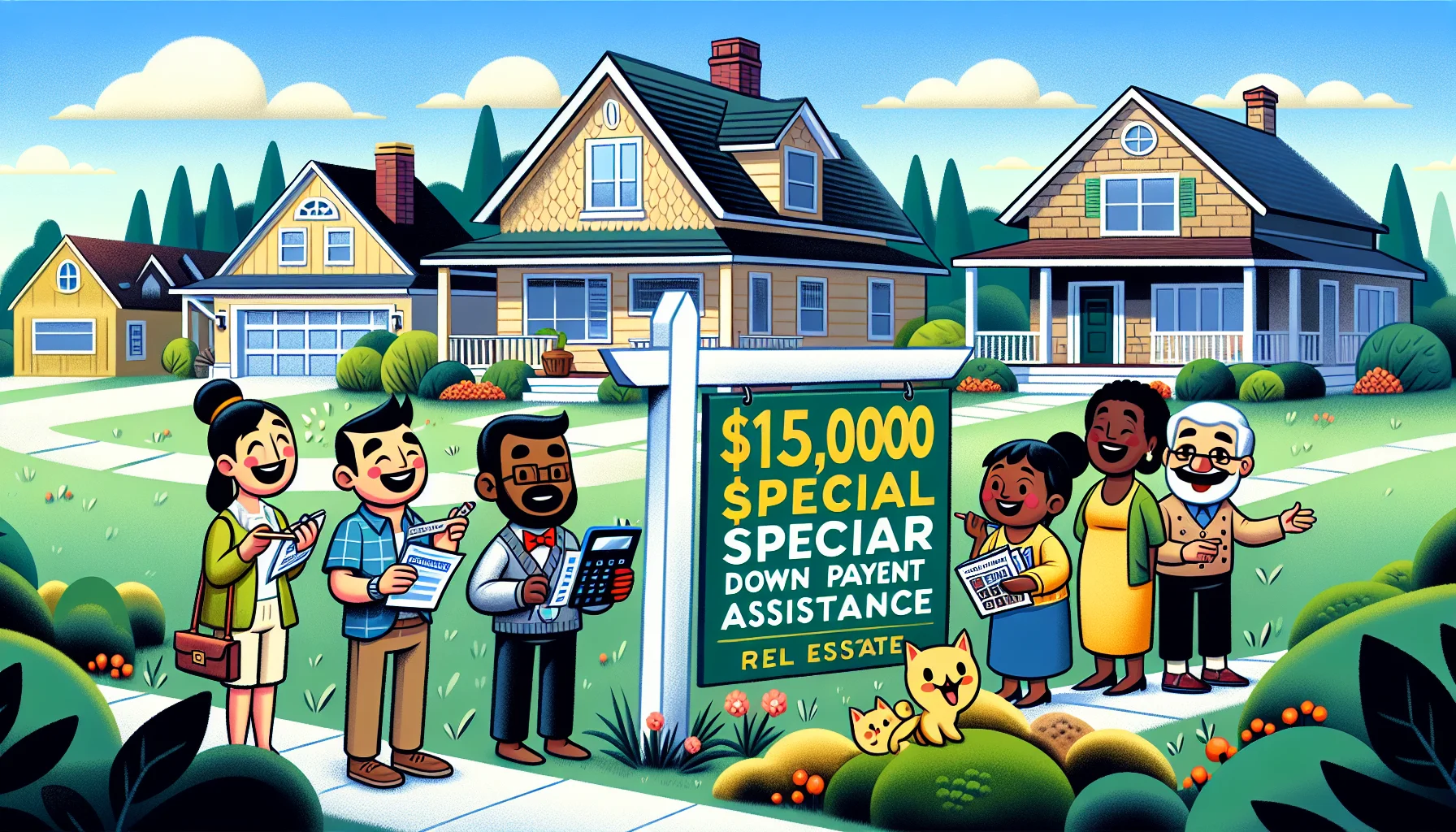$15,000 special down payment assistance Quiz
Test Your Knowledge
Question of
Understanding $15,000 Special Down Payment Assistance
The $15,000 special down payment assistance is a golden opportunity for potential homeowners, designed to make the dream of owning a home more attainable. This assistance aims to reduce the financial burden on buyers by providing substantial support towards the down payment on a new home. It's a transformative initiative that can turn the tide for many by making what seemed impossible, possible.
Accessing this assistance could be the game-changer you need in your journey towards homeownership. It not only alleviates a significant part of the financial strain associated with buying a home but also opens up more options in terms of property choices. Don't let this chance slip through your fingers; understanding and leveraging this assistance could be your key to unlocking the door to your new home.
Eligibility Criteria for Assistance
To tap into this incredible opportunity, meeting the eligibility criteria is crucial. The program typically targets individuals or families with specific income levels to ensure that the assistance reaches those who need it most. Ensuring your income falls within the specified range is the first step towards qualifying for this life-changing assistance.
Moreover, being a first-time homebuyer is often a prerequisite for this kind of assistance. This status not only includes individuals buying their first home but also those who haven't owned a home in the past three years. This criterion aims to level the playing field and give a fresh start to those venturing into homeownership.
Types of Properties Covered
The $15,000 special down payment assistance isn't just limited to traditional single-family homes; it encompasses a variety of property types. This inclusivity ensures that applicants have the freedom to choose a property that best suits their needs and preferences, whether it's a cozy single-family home or something else.
Condominiums and townhouses are also eligible under many of these programs, broadening the scope for potential homeowners. This flexibility allows applicants to explore different types of living spaces, from convenient condos to spacious townhouses, ensuring they find their perfect match.
Application Process for Down Payment Assistance
Navigating the application process efficiently is key to securing down payment assistance. Being prepared with all necessary documentation, such as proof of income and homeowner education certificates, can streamline your application process. Attention to detail and thorough preparation can set your application apart.
Understanding the timeline and deadlines associated with applying for down payment assistance is critical. Missing a deadline can mean missing out on valuable assistance. Stay ahead of the curve by marking important dates on your calendar and submitting all required documents well before deadlines approach.
- Gather all necessary documents early: Start compiling documents such as tax returns, pay stubs, and identification well before you plan to apply.
- Understand your eligibility: Thoroughly review all eligibility criteria to ensure you qualify before investing time and effort into applying.
- Seek guidance: Don't hesitate to reach out to program administrators or housing counselors for help navigating the application process.
- Avoid common mistakes: Common pitfalls include missing deadlines, incomplete applications, and misunderstanding eligibility requirements.
Maximizing Benefits of Down Payment Assistance Programs
Leveraging Assistance for Better Loan Terms
Down Payment Assistance Programs (DPAs) are a game-changer for prospective homeowners, offering a unique opportunity to secure more favorable loan terms. By reducing the initial financial burden, these programs can open doors to properties that might have been out of reach. It's essential to understand how these benefits can directly impact your loan conditions.
Interest Rate Reductions: One of the most significant advantages of utilizing DPAs is the potential for reduced interest rates. A lower down payment doesn't have to mean higher interest. In fact, many lenders offer competitive rates for DPA beneficiaries, acknowledging the stability provided by these programs.
Lower Monthly Payments: By securing a larger down payment through assistance, borrowers can drastically reduce their monthly mortgage payments. This not only makes homeownership more affordable but also improves your long-term financial stability by freeing up income for other investments or savings.
Combining with Other Homebuyer Programs
The power of DPAs multiplies when combined with other homebuyer programs. Savvy buyers explore all available options, stacking benefits to maximize their purchasing power and minimize costs. This strategic approach can significantly enhance the overall affordability of buying a home.
Federal and State Grants: Many federal and state grants exist specifically to assist first-time and low-income homebuyers. These grants can often be combined with DPAs, providing an even stronger financial foundation for your purchase.
Tax Credit Opportunities: Don't overlook tax credit opportunities that can further reduce the cost of homeownership. Programs like the Mortgage Credit Certificate (MCC) allow you to claim a portion of your mortgage interest as a tax credit, providing annual savings that add up over time.
Financial Planning with Down Payment Assistance
Effective financial planning is crucial when leveraging Down Payment Assistance Programs. A comprehensive budget that accounts for all homeownership costs ensures you're fully prepared for the financial commitment you're about to make. Proper planning leads to more informed decisions and a smoother transition into homeownership.
Budgeting for Homeownership Costs: Beyond the mortgage, owning a home comes with additional expenses such as property taxes, insurance, maintenance, and repairs. It's imperative to factor these into your budget to avoid any surprises down the line.
- Emergency Fund: Start building an emergency fund that covers at least 3-6 months of living expenses, including mortgage payments, to safeguard against unforeseen circumstances.
- Extra Mortgage Payments: Whenever possible, make extra payments towards your mortgage principal. This reduces the total interest paid over the life of the loan and can significantly shorten its term.
- Invest in Home Improvements: Consider investing in cost-effective home improvements that increase energy efficiency and reduce utility bills. Over time, these savings contribute to your overall financial health.
- Diversify Investments: Don't put all your eggs in one basket. Diversify your investments beyond real estate to build a robust financial portfolio that can weather market fluctuations.
Navigating the Real Estate Market with Down Payment Assistance
Finding Eligible Properties
Unlocking the door to your dream home starts with finding properties that qualify for down payment assistance. This crucial step demands attention to detail and a strategic approach. Partnering with knowledgeable real estate agents who are familiar with down payment assistance programs can make all the difference. These professionals know exactly where to look and what to look out for, ensuring you don't miss out on potential opportunities.
Focus your search on targeted areas where down payment assistance programs are most active. Many programs are designed to encourage homeownership in specific neighborhoods, often aiming to revitalize or support particular communities. By zeroing in on these areas, you not only maximize your chances of finding an eligible property but also contribute to the growth and development of these communities.
Working with Real Estate Agents
Real estate agents who specialize in down payment assistance programs are invaluable allies. They possess a deep understanding of eligibility requirements and can guide you through the complexities of the housing market. These agents leverage their networks and resources to uncover hidden gems that meet program criteria, saving you time and energy in your property search.
Searching in Targeted Areas
Targeted areas often have a higher concentration of properties eligible for down payment assistance. Researching and understanding the characteristics of these neighborhoods can provide insights into market dynamics and potential investment opportunities. By concentrating your efforts in these regions, you enhance your chances of finding a home that not only fits your budget but also qualifies for valuable financial aid.
Understanding Market Trends and Pricing
Analyzing local market data is essential for anyone looking to purchase a home with down payment assistance. Understanding trends such as average home prices, inventory levels, and days on market can provide a competitive edge. This knowledge allows you to gauge the health of the market, identify opportunities, and make informed decisions.
Analyzing Local Market Data
Dive deep into local market data to get a clear picture of what you're stepping into. This analysis will reveal the ebbs and flows of the market, helping you pinpoint the perfect timing for your purchase. Whether it's identifying a buyer's market or recognizing when prices are favorable, this information is crucial for strategic planning.
Timing Your Purchase Strategically
The timing of your purchase can significantly impact the deals available to you. Seasonal trends often influence inventory levels and prices, offering savvy buyers opportunities to secure better deals. Timing your purchase strategically could mean capitalizing on end-of-year sales or jumping on new listings in spring when inventory typically increases.
Negotiating Deals with Sellers
Making competitive offers is key to negotiating successful deals in todays real estate market. Your offer needs to stand out to sellers while ensuring you stay within budget constraints imposed by down payment assistance qualifications. Crafting an offer that appeals to both parties requires careful consideration of the propertys value, current market conditions, and seller motivations.
- Avoid lowball offers: They can alienate sellers and diminish your chances of securing the property.
- Understand seller motivations: Tailor your offer based on whether the seller is looking for a quick sale, higher price, or specific closing terms.
- Include personal touches: A personalized letter explaining why youre interested in their home can make your offer stand out.
- Be flexible with closing dates: Showing willingness to work with the sellers timeline can give you an edge over other buyers.
Making Competitive Offers
In crafting your offer, consider more than just priceterms like contingencies, closing costs, and move-in dates play significant roles in negotiations. A well-rounded offer that addresses these aspects while remaining financially sound underlines your seriousness and capability as a buyer.
Contingencies and Closing Costs
Negotiating contingencies and closing costs effectively can lead to substantial savings and smoother transactions. Being open to negotiation on inspection results or offering to share certain closing costs can make your offer more attractive. However, it's crucial not only to protect your interests but also not to overextend financially by waiving essential contingencies without due consideration.
The Impact of Down Payment Assistance on Mortgage Approval
Loan-to-Value Ratio Considerations
Down payment assistance can significantly lower your loan-to-value (LTV) ratio, making you a less risky prospect for lenders. A lower LTV ratio means you're borrowing less relative to the value of the home, which could lead to better interest rates and easier approval. This is a game-changer for many first-time homebuyers!
Understanding Equity Implications : By reducing the amount you need to borrow, down payment assistance programs instantly increase your home equity. This is crucial because higher equity at the outset sets a solid foundation for your financial future. It's not just about getting in the door; it's about building wealth from day one!
Future Refinancing Options : A lower LTV ratio also opens up more attractive refinancing options down the road. Whether it's to snag a lower interest rate or tap into home equity, having that initial assistance can give you more flexibility and financial leverage later on.
Debt-to-Income Ratio and Loan Approval
Calculating Your Financial Health : Your debt-to-income (DTI) ratio is a critical factor in mortgage approval. Down payment assistance can indirectly improve your DTI by enabling you to secure a smaller loan, which means lower monthly payments. This is a vital consideration for lenders assessing your ability to manage payments effectively.
To truly maximize your chances of approval, focus on enhancing your financial standing. **Reducing outstanding debts** and **increasing income** are key strategies that can significantly impact your DTI ratio in a positive way.
Building a Stronger Mortgage Application
Importance of Credit Scores : In the world of mortgage lending, your credit score is king. High credit scores unlock the doors to better rates and terms. Down payment assistance combined with a strong credit score creates an irresistible profile for lenders.
Gathering Compelling Documentation : Never underestimate the power of thorough and accurate documentation. From proof of income to asset statements, every document plays a crucial role in painting a complete picture of your financial health.
- Maintain or Improve Your Credit Score: Pay bills on time, reduce balances on credit cards, and avoid taking on new debt before applying for a mortgage.
- Gather All Necessary Documents Early: Tax returns, pay stubs, bank statements, and any other required documents should be organized well in advance.
- Consider All Down Payment Assistance Options: Research local, state, and federal programs that may offer grants or low-interest loans to help with your down payment.
- Avoid Major Purchases: Big-ticket items can significantly impact your DTI ratio and credit scorewait until after closing on your home to make these purchases.
- Consult with Mortgage Professionals: A knowledgeable lender or mortgage broker can provide invaluable advice tailored to your specific situation.
Preparing for Homeownership with Down Payment Assistance
Embarking on the journey of homeownership is a thrilling adventure, and down payment assistance can be a game-changer for many prospective buyers. It's a powerful tool that can open doors to owning your dream home sooner than you thought possible. However, it's crucial to understand that the initial purchase is just the beginning. Preparing for the ongoing responsibilities of homeownership is essential for long-term success and financial stability.
Down payment assistance programs can significantly reduce the upfront costs of buying a home. This enables buyers to allocate funds towards future home maintenance, improvements, and other unforeseen expenses. It's vital to explore these programs early in your home-buying process, ensuring you're fully equipped to make informed decisions and plan ahead effectively.
Home Maintenance and Upkeep Responsibilities
Budgeting for Repairs and Maintenance
Owning a home means being ready for anything, including those unexpected repair bills. Setting aside a portion of your budget specifically for home maintenance is not just smart; it's necessary. A well-maintained home retains its value and provides a safe haven for your family. Start by saving at least 1% of your homes value annually for maintenance and repairs its a small step that pays off big in the long run.
Anticipate seasonal maintenance tasks and plan financially for them throughout the year. This proactive approach can prevent minor issues from ballooning into costly repairs. Regular upkeep not only saves money but also keeps your living space comfortable and secure.
Learning Basic Home Improvement Skills
Empower yourself by learning basic home improvement skills. Knowing how to perform simple repairs can save you a ton of money and give you a sense of accomplishment. There are countless resources available online, including tutorials and workshops, that can teach you everything from fixing a leaky faucet to patching drywall.
Investing time in acquiring DIY skills means you're less reliant on professionals for every small fix or update. This doesnt just cut costs; it also ensures youre better prepared to maintain your homes value over time.
Managing Homeownership Expenses Beyond the Mortgage
Property Taxes and Insurance Costs
Your mortgage payment is just one piece of the homeownership puzzle. Property taxes and homeowners insurance are significant annual expenses that can fluctuate over time. Understanding these costs before buying can help you budget effectively and avoid surprises down the line.
Research local tax rates and insurance premiums as part of your house-hunting process. This foresight allows you to estimate ongoing ownership costs accurately, ensuring youre financially prepared for the long haul.
Utility Bills and Homeowner Association Fees
Utility bills can vary widely based on location, home size, and usage habits. Factor these into your monthly budgeting to avoid being caught off guard by higher-than-expected expenses. Energy-efficient upgrades can help mitigate these costs over time.
If your new home is part of a homeowner association (HOA), monthly or annual fees are part of the deal. These fees go towards maintaining common areas and amenities, so understanding what they cover is crucial for evaluating their value.
Creating a Long-Term Homeownership Plan
Setting Up an Emergency Fund
- Prioritize Saving: Begin by setting aside a small amount each month into an emergency fund specifically designated for unforeseen homeowner expenses.
- Increase Contributions Over Time: As your financial situation improves, gradually increase your contributions to this fund.
- Aim for 3-6 Months Expenses: Ideally, aim to save enough to cover between three to six months worth of living expenses, giving you a safety net should major repairs or job loss occur.
- Maintain Accessibility: Keep this fund in an easily accessible account so you can quickly draw on it when needed without facing penalties or delays.
Planning for Future Home Upgrades
Your home should evolve as your life does. Planning for future upgrades not only enhances your living experience but also boosts your property's value over time. Whether its renovating the kitchen or adding sustainable features like solar panels, think long-term about how you want your home to grow with you.
Create a wishlist of desired upgrades and start budgeting for them now. This strategic planning ensures that when the time comes for improvements, youre financially ready to take them on without compromising other financial goals or dipping into emergency funds.
Legal and Tax Implications of Down Payment Assistance
Understanding the Legal Agreements Involved
When you dive into the world of down payment assistance, it's crucial to grasp the legal agreements that come with it. These agreements are not just paperwork; they are binding commitments that dictate your obligations and rights. Ignoring the details can lead to unexpected surprises down the road.
Reading the Fine Print of Assistance Programs is a MUST. Every program has its unique terms and conditions, from interest rates to repayment schedules. Understanding these details ensures you're making an informed decision, aligning your financial goals with the program's requirements.
Obligations After Receiving Assistance cannot be overlooked. Whether it's maintaining primary residence status or meeting specific financial thresholds, failing to comply can result in penalties or even repayment demands. Knowing these obligations upfront will help you navigate your homeownership journey smoothly.
Tax Benefits and Responsibilities for Homebuyers
The silver lining of down payment assistance comes in the form of tax benefits. However, these benefits come hand-in-hand with responsibilities that you must be aware of to maximize your advantages and stay compliant with tax laws.
Deducting Mortgage Interest and Property Taxes is a significant perk for homeowners. This deduction can lead to substantial savings on your annual tax bill, making homeownership more affordable in the long run.
Reporting Assistance on Tax Returns is critical. Depending on the nature of your assistance, it may be considered taxable income or have other tax implications. Accurate reporting ensures you're benefiting from potential deductions while avoiding penalties for underreporting.
Navigating Repayment or Forgiveness Terms
The terms surrounding repayment or forgiveness of down payment assistance can significantly impact your financial planning. Understanding these terms is key to leveraging the full benefits of your assistance program.
Conditions for Loan Forgiveness often include stipulations such as remaining in the home for a certain number of years. Meeting these conditions can lead to partial or full forgiveness, translating into direct financial gains for you.
- Mistakes to Avoid:
- Assuming all programs offer forgiveness without fully understanding the specific conditions attached.
- Failing to consider how changes in residency or property status might affect forgiveness eligibility.
- Ignoring potential tax implications of forgiven debt, which could be considered taxable income under certain circumstances.
- Neglecting regular communication with lenders about changes in financial status that could affect repayment terms.
Repayment Scenarios and Options vary widely among programs. Some may offer flexible repayment plans or sliding scales based on income, making it easier to manage alongside other financial responsibilities. Familiarizing yourself with these options can save you stress and money over time.
Success Stories: Real-Life Examples of Down Payment Assistance Impact
First-Time Homebuyers Achieving Their Dreams
Countless first-time homebuyers have turned their homeownership dreams into reality, thanks to down payment assistance programs. These individuals often come from diverse backgrounds but share a common goal: to own a home. With determination and the right support, they overcome the odds, proving that homeownership is within reach for those who dare to dream big.
Personal Journeys to Homeownership are unique and inspiring. From single parents working multiple jobs to young couples saving every penny, these stories highlight the perseverance and dedication required to achieve such a significant milestone. Each journey underscores the transformative power of homeownership, bringing stability and pride to new homeowners.
Lessons Learned from the Process are invaluable. First-time homebuyers often emphasize the importance of financial literacy, budgeting, and the need for patience during the home buying process. They stress that understanding your financing options and seeking down payment assistance can make all the difference in turning your homeownership dream into a reality.
Overcoming Financial Hurdles with Assistance Programs
Stories of Financial Turnarounds showcase how down payment assistance programs have been game-changers for many. Individuals who once believed homeownership was out of their reach due to financial constraints have found hope and solutions through these programs. Their success stories serve as powerful testimonials to the impact of financial support and guidance.
Strategies That Made a Difference include taking advantage of down payment assistance programs, improving credit scores, and managing debt effectively. These strategies are crucial in overcoming financial hurdles on the path to homeownership. By sharing these tactics, successful homebuyers inspire others to pursue their dreams with renewed confidence.
- Mistakes to Avoid:
- Not exploring all available assistance programs: Many potential homebuyers miss out on valuable resources simply because they're unaware of them.
- Rushing the process: Take your time to understand all your options and make informed decisions.
- Failing to improve credit scores: A better credit score can significantly improve loan terms.
- Overspending on a home: Stay within your budget to avoid financial strain down the line.
Long-Term Benefits of Early Homeownership
Building Equity Over Time is one of the most significant advantages of early homeownership. As you pay off your mortgage, you build equity in your property, which can provide financial security and flexibility in the future. This equity can be used for various purposes, such as funding education or investing in additional properties.
Advantages of Starting Young include getting a head start on building wealth, enjoying tax benefits, and having the freedom to customize your living space. Starting young also allows more time to recover from market fluctuations and benefit from long-term appreciation in property value. Early homeownership sets a solid foundation for financial success and stability.
Staying Informed: Resources and Updates on Down Payment Assistance
Keeping Up with Policy Changes and Program Updates
Understanding the ever-evolving landscape of down payment assistance is crucial. Governments at various levels frequently update policies, impacting eligibility, benefits, and application processes. To stay ahead, you must keep a keen eye on these changes. It's not just about grabbing opportunities; it's about ensuring you're fully informed to make the best decisions for your home-buying journey.
Government Websites and Official Announcements are your primary sources of truth. These platforms provide the most accurate and timely information regarding down payment assistance programs. Checking them regularly ensures you're up-to-date with the latest policy changes and program updates that could significantly affect your home purchase plans.
Subscribing to Newsletters and Alerts is another strategy to stay informed without constantly scouring for updates. Many organizations offer newsletters that summarize the most recent changes and upcoming opportunities in down payment assistance. This way, crucial information comes straight to you, saving time and keeping you informed effortlessly.
Engaging with Community Resources and Workshops
Local Housing Agencies and Nonprofits play a vital role in providing down payment assistance and educating potential homebuyers. These organizations often have firsthand knowledge of local market conditions and available resources, making them invaluable in your search for assistance. Engaging with these entities can open doors to programs uniquely suited to your needs.
Homebuyer Education Classes and Seminars are not just about learning the basics of buying a home; they're also about discovering financial assistance opportunities you might not find elsewhere. Participating in these educational offerings equips you with knowledge about navigating the housing market, including how to secure down payment assistance effectively.
Networking with Industry Professionals and Peers
Joining Real Estate Forums and Groups offers more than just camaraderie; it provides access to a wealth of shared knowledge and experiences. Here, you can learn from others' journeys, get tips on applying for down payment assistance, and even hear about programs before they become widely known. It's a powerful way to stay connected and informed.
Attending Real Estate Events and Conferences might seem like a significant investment of time and resources, but the payoff is immense. These gatherings are hotspots for learning about industry trends, networking with professionals, and discovering new programs or changes in existing ones. They offer a unique opportunity to gather insider knowledge that can greatly aid in securing down payment assistance.
- Maintain an active presence: Regular participation in forums, events, and workshops increases your visibility and access to information.
- Leverage social media: Follow relevant organizations, agencies, and professionals on platforms like LinkedIn or Twitter for real-time updates.
- Create alerts: Use tools like Google Alerts with keywords related to down payment assistance programs to receive automated updates.
- Ask questions: Don't hesitate to seek clarification or further information when engaging with professionals or through online platforms.
- Share what you learn: Contributing your discoveries back into forums or groups not only helps others but can also lead to reciprocal sharing of information.












